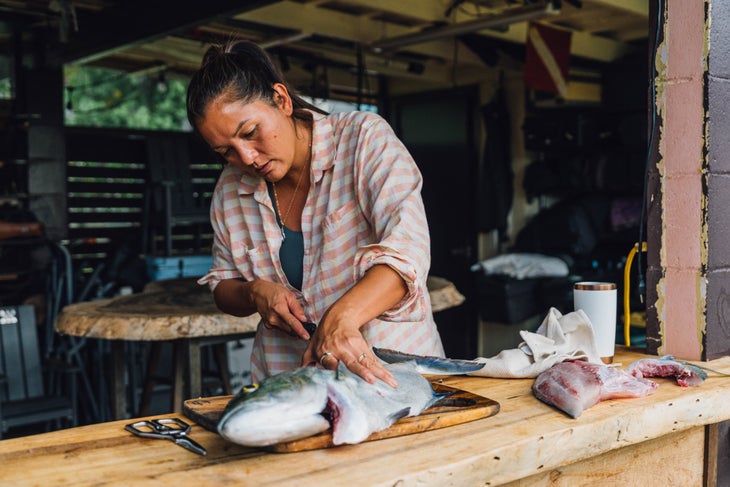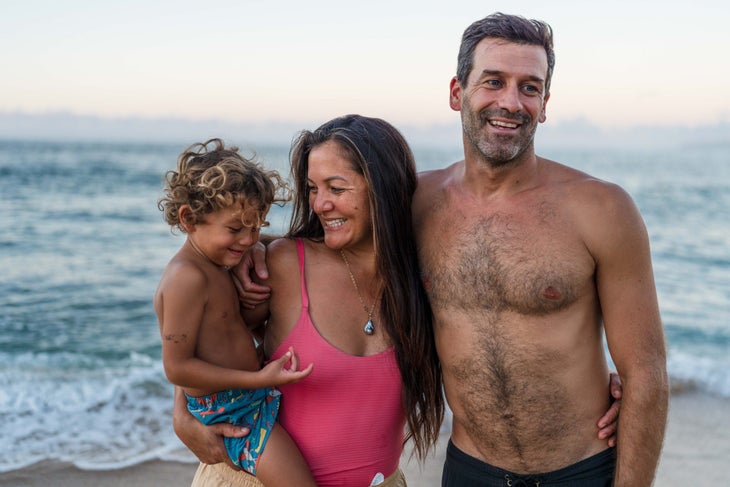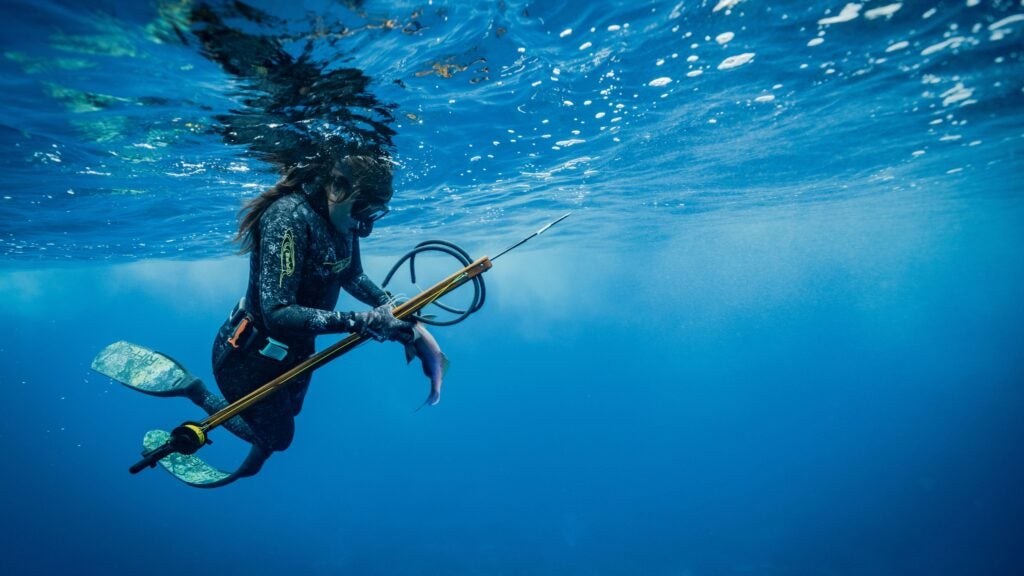Kimi Werner grew up in a remote part of Maui and was introduced to spearfishing at a young age. She often accompanied her father, who went freediving in search of wild fish to feed their family. But Werner didn’t spearfish on her own until the age of 24. She quickly became obsessed with the sport and started reaching new depths, catching and cooking new types of fish, and eventually competing. After winning trophies, her relationship with the ocean changed. Werner left the competition world and, eventually, found a way to reconnect with the sea and the sport that had transformed her life.
Here’s Kimi Werner’s story, as told to writer Julia Ries.
I was introduced to spearfishing when I was five years old. I grew up in a rural part of Maui, and at the time, my family had little money. My dad would go freediving and spearfishing just to put food on the table. He said if I could keep up, I could tag along. So, he’d put me on his back, and we’d hike down cliffs and jump into water that was 30 to 40 feet deep.
I didn’t have a spear, just a snorkel, mask, and rubber fins, but I absolutely loved following him into the deep, blue ocean—it felt as if I was flying.
We’d come home with fish commonly found in Hawaii’s coastal waters—like the shimmery silver āholehole and the vibrant red or bluish-green menpachi—and my mom would put so much care into cleaning and caring for them. We buried all the parts we didn’t eat, like the gut and scales, into the plants—like Liliko’i (passion fruit), oranges, guavas, and strawberries—that fed us. It was very harmonious. We lived in this tiny shack made of seriously rotting wood covered in moss. I had no idea we were poor. I loved my life.
When I was seven, my parents started making more money. My mom became an emergency room nurse, and my dad’s construction business took off. We moved from the boonies in Haiku, a tiny, rural, unincorporated area on the North Shore of Maui (where we had no neighbors), to a subdivision with paved roads and grocery stores. My dad got a boat, and every once in a while, we’d still go diving and fishing—now for recreation rather than necessity.
I was such a little foodie, always helping my mom and experimenting with cooking in the kitchen. But this was a drastic change, moving from the middle of nature into civilization, and I was heartbroken. All I wanted was to go back to my old life in Haiku. Life there was simple and beautiful—every part of my heart enjoyed it.
Eventually, I adjusted and rolled with this new life. When it came time to graduate from Maui High School, I had no idea what I wanted to do. Cooking seemed like the path to take, so I went to culinary school on the island of Oahu.
I’d been getting ocean time as a canoe paddler (FYI: Canoe paddling is a popular team sport in the Hawaiian islands, recognized as the state’s official sport. The sport is deeply woven into Hawaiian culture because the early settlers arrived on these islands by canoe). But when I graduated at 21, I realized I’d been happy enough, but something was missing. Before I knew it, I was working a restaurant job in Honolulu where I was serving the same food every day—it was imported and frozen, and I felt no connection to it. My mind often went back to those early childhood days of diving and my mom cooking these little fish we caught. It was like I was still mourning my life in Haiku, even as a grown-ass woman.
One day, I went to a canoe paddling regatta, and after the race, some of the boys in my club set up a barbecue where they put a bunch of tiny fish on the grill. My heart jumped out, and I recognized the fish instantly, feeling overwhelmed with love and admiration for them. These weren’t the fish you see at grocery stores. They were fishermen’s fish, the type I grew up eating, the āholehole, and the menpachi. I asked where they got them, and they said from spearfishing. A light bulb went off in my head, and my heart skipped a beat—maybe it was possible to get my old lifestyle back.
After that, I kept asking people to take me diving with them, but that didn’t happen. One day, when I was 24, I went to a fishing shop and bought a three-prong spear. I packed my mask and my boogie-boarding fins and drove to a random beach. When I got out of my car, I felt so embarrassed and self-conscious—I thought, I’m just a girl with a spear, and everyone’s going to look at me and know I have no idea what I’m doing. I thought the anxiety would go away when I got into the water, but it worsened because I realized that, indeed, I had no idea what I was doing.
It was windy, so the water was choppy and murky. I grew paranoid about sharks and felt frantic. In my head, I was like, this was a stupid idea; I should have never done this.
Right when I was about to turn around and go back to the shore, a wave broke, and I was surrounded by bubbles. I felt like I was out in the ocean with my dad again and suddenly felt at peace. I kept swimming until I came across a reef that was 20 to 25 feet below surface level.
Trying to remember what my dad did, I held my breath, kicked down, and looked in holes in the reef where I found tiny fish. I tried to spear them, and after a bunch of trial and error, I snatched up five fish. It was a humble catch, but it felt like I had found gold.
I went home, cleaned the fish, and cooked them for my roommates. I thought to myself, I made the best meal of my entire culinary career with just salt and pepper. I realized I would never let go of an experience like this again. That day changed everything.
I became obsessed with spearfishing. It’s all I wanted to do, and I was going into the ocean as frequently as I could. Spearfishing transformed my health by giving my body an extreme cleansing exercise. It was helping me eat clean by providing an excellent source of nutrients and wild protein.
I brought the fish I caught to the paddling regattas, and those boys finally invited me to dive with them. I got so many dive partners and learned a ton about what to do and what not to do.
One day, I watched this special on TV featuring these national spearfishing championship competitors who swam to great depths and caught huge fish. I tracked those guys down and showed up at the bar they hung out at. I introduced myself and, week after week, went back, and they’d give me tips. Deep down, I wanted to be able to compete like they had. One night they invited me to dive with them—and that’s when they became my mentors. They took my diving to a whole new level.
I learned that in order to freedive well, you need to be relaxed; panicking is fatal. You might see a fish that’s your dream fish, but if you get too excited, you won’t be able to hold your breath and catch it. You need to swim slowly enough to lower your heart rate and conserve your oxygen.
You’re positively buoyant at the surface of the ocean, which means you have to kick really hard so you don’t just float on top of the water, but you lose buoyancy the deeper you go and don’t have to kick as hard. At 30 feet, you become neutrally buoyant, so if you stop kicking, you’ll stay in the same place—you won’t float or sink. At around 60 feet, the ocean pulls you down. In turn, you become negatively buoyant and start sinking, so you no longer have to kick. The pressure increases, and the ocean squeezes you. At first, that sensation caused me so much discomfort and anxiety, but I eventually got used to it. It kind of felt like a hug from the ocean.
Within a year, I was diving to 60 feet. I saw fish I didn’t know existed—huge snappers and goatfish. I’d take them home and make sashimi and crudo. I was consistently feeding myself.
![Kimi holds up a Moano (Blue Goatfish) off the north shore of O‘ahu. [Photo: Justin Turkowski]](https://cdn.outsideonline.com/wp-content/uploads/2024/10/20231131_blackkoles_turkowski_kimiwerner_simplenoteasy_webres.jpg-7-scaled.jpg?width=730)
Over the next few years, I doubled that depth and thought I was ready to compete. In 2008, I went to the National Spearfishing Championship in Newport, Rhode Island. I entered as a two-person team with my dive partner Andy Tamasese and won every category I was able to place in—1st place in the mixed team, 1st place in the individual women’s division, and I snagged the largest fish in the women’s division with a 33-pound striped bass (which was also the second largest fish caught during the entire contest). I caught striped bass, tautogs, and scup. I was named Rookie of the Year. I finally felt validated.
But, afterward, I wanted to keep riding the high that comes with nabbing more wins. I would look at fish as points—and that feeling of unfulfillment crept back. I got into spearfishing to reconnect to my roots and upbringing and to feed myself simply.
Spearfishing was supposed to be about my connection to the ocean—not winning trophies. I didn’t like how my relationship with the sea was changing, so I decided to listen to my heart and quit competing.
After choosing this, I became an artist and started painting the fish I saw underwater onto trucker hats. I sold them for $20. I could barely pay my rent, but I didn’t have set hours, which meant I had the freedom to dive whenever the weather was nice. I created a garden to grow my own food, and it brought me back to my childhood and how we fed ourselves. I felt like my parents when they were poor—which, weirdly, was my own version of success.
But viewing this as a true achievement didn’t happen overnight. At first, I felt like a failure, like I walked away from my only chance at making a career out of diving. When I went into the water again, I questioned whether I made the right choice. My brain was so noisy, which affected my diving; I couldn’t hold my breath or aim well, and I ended up having to take a break from it. I’d still swim, but I’d leave the spear at home.
One day, my friends and I went kayaking, and I tried to dive, but suspending my breathing felt impossible. It was excruciating. I got back on my kayak. Then I decided to try once more—I dove to the bottom of the ocean, laid on my belly face-down in the sand, and let every inner voice call me whatever mean name it wanted to. Then the last voice came and went. That was the moment things got better. I felt like the ocean still loved me.
I started diving again just to be with the fish. Then I brought my three-prong spear and resumed catching the easy little fish first, eventually working up the nerve to go after some gnarlier fish. I dove deep and felt calm again.
Spearfishing has hugely supported my mental health. It’s given me passion, purpose, and presence. It’s given me a community of like-minded people who share their healthy harvests of mangoes, greens, avocados, fresh eggs, and venison. It’s given me a lifestyle of eating closer to nature and getting the most out of it.

I began working with a nature conservancy and, with it, received new opportunities to travel, dive, and see the world. I got my first sponsors (like Patagonia and later Protekt) and collaborated with production companies that wanted to film my diving.
I met my husband, Justin Turkowski, a snowboarding cinematographer, on a TV production I worked on in 2012. He moved to Hawaii for our relationship. I taught him how to freedive, and he’s now one of the best underwater cinematographers. We’ve done a lot of productions and documentaries together and started a YouTube cooking channel. This was a path I created based on my true values.
My son is four, just about the age I was when I started diving. I’ve taken him out on my back once, and I hope to do that more. He wakes my husband and me up early to go to the harbor to fish with a little pole before preschool, then begs me to cook the fish and put it in his lunchbox. He’s a total water baby. It reminds me of diving with my dad.

I still spearfish a couple of times a week—to about 100 feet, sometimes more—weather permitting. But the most important role spearfishing plays now is that it enables me to go out and get fish to feed my family.
